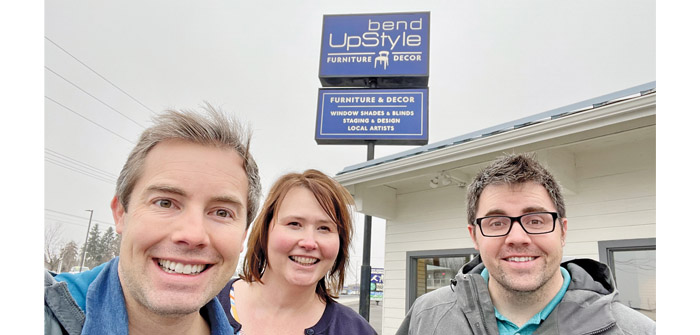(Bend UpStyle owners (left to right) Randy, Jeanette and Jeremy Wright are preparing to open their new location | Photo Courtesy of Randy Wright)
Family-run businesses have long been the heartbeat of American economy, from garage-based mom and pop shops to huge multigenerational corporations. An article in Inc.com states that according to the U.S. Bureau of the Census, about 90 percent of American businesses are family-owned or controlled. The article goes on to say that these businesses can range in size from two-person partnerships to Fortune 500 firms, and they account for half of the nation’s employment and half of its gross national product.
While family businesses have always operated a bit differently from their non-family-run counterparts, this past year has clearly driven that point home. The pandemic has affected family businesses in many ways both here in Central Oregon and around the world, just as it has affected other enterprises. In a June 2020 Forbes website article titled 5 Ways Family Businesses Can Adapt to COVID-19, it was reported that a recent BanyanGlobal survey of family businesses found that 82 percent had seen a negative impact on their business from the COVID-19 pandemic, and about half of those said the impact has been significant. However, families who run a business together have the benefit of trusted relationships that have been built over time with other family members, employees, customers, suppliers and the community.
A Harvard Business Review article titled A Crisis Playbook for Families by Josh Baron and Ben Francois says that family businesses “differ from other companies in that their form of ownership gives them the ability to take critical actions that could help them through these difficult times.” The article states, “In a business crisis, the power of family business owners is magnified. Unlike public companies, which typically focus on maximizing shareholder value, family owners value objectives that usually go well beyond financial returns (e.g., family legacy, reputation). This crisis is forcing family businesses to make trade-offs among those objectives that would have previously been unimaginable — all while dealing with the complex dynamics of a family.” The article continues, “The stress, anxiety and fear that come out in a crisis can amplify already challenging dynamics… On the other hand, the crisis can be a call to action, causing family owners to ‘rally around the flag,’ put aside their differences and take actions that allow the business to survive.”
In a thorough and detailed report on family businesses published by Deloitte Private titled Private Company Issues and Opportunities 2020-Family Business Edition, authors William Chou and Carl Allegretti state that successful family businesses tend to have one quality in common: a sense of purpose beyond being profitable. The report says, “Of course, making enough money to sustain a business is as important to family-owned concerns as it is to any other commercial enterprise. But they are also driven by unique pursuits that, for many, will define their legacies for years to come. Whether it’s a commitment to giving back to their community, becoming environmentally sustainable or producing a perfectly crafted product, purpose informs everything they do.”
Within the Deloitte Private report, an article by Larry Keeley, president and co-founder of Doblin, a Deloitte business, stresses the importance of assessing the health of a family business. It says, “You don’t have to look too far to find examples of extremely successful family businesses that have stumbled or fallen apart due to conflict or strife within the family. Multibillion-dollar enterprises have been split up and sold off over family quarrels that metastasized and undermined those who remained keenly focused on the company’s success.”
The key to maintaining health in a family business is communication, according to another article within the Deloitte Private report written by Michelle Osry, partner and family enterprise consulting practice leader of Deloitte Canada. “Communication is probably the single-most-important ingredient in building and managing a successful family enterprise, but it often proves to be the most difficult part,” the article says. It goes on to offer the following tips to improving communication:
- Identifying and addressing generational, cultural and gender biases and emotional triggers;
- Listening empathetically, asking genuinely open-ended questions and accepting that we all come to any conversation with our own story and assumptions, and understanding that these traits are all skills that must be learned;
- Remembering that practicalities are important, such as scheduling family meetings in a neutral location, having ground rules that differentiate them from family gatherings and ensuring that participants are prepared, briefed and present; and
- Investing one-on-one time with family members, especially those who are more withdrawn or less likely to speak up during group gatherings, to build trust and understanding.
While it remains to be seen just how significant the pandemic will affect family-operated and other businesses in the long run, here are a few encouraging statistics offered by The Conway Center, a 501(c)3 nonprofit (familybusinesscenter.com) that provides educational resources and programs for family-owned businesses:
- Family businesses account for 64 percent of U.S. gross domestic product, generate 62 percent of the country’s employment and account for 78 percent of all new job creation.
- Family-owned businesses are the backbone of the American economy. Studies have shown about 35 percent of Fortune 500 companies are family-controlled and represent the full spectrum of American companies from small businesses to major corporations.
- Roughly 90 percent of the families responding to a survey in From Longevity of Firms to Trans-generational Entrepreneurship of Families: Introducing Family Entrepreneurial Orientation indicated that they control more than a single firm. The results of the survey suggest that there is strong entrepreneurial activity undertaken by controlling families beyond their core company.
- Research shows that family businesses are less likely to lay off employees regardless of financial performance.
If you are part of a family business and are looking for help in keeping your company, staff and family afloat, there are a multitude of resources that can be helpful in navigating the tides of coronavirus and small-business practices in general. Here are a few websites, articles and sources to check out that contain a plethora of useful information:
- Family Business magazine: familybusinessmagazine.com
- Deloitte Private report, Private company issues and opportunities 2020-Family business edition: (2.deloitte.com/content/dam/Deloitte/ca/Documents/deloitte-private/ca-global-thought-leadership-en-aoda.pdf) by William Chou, Deloitte Private global family business leader and Carl Allegretti, Global Deloitte Private Leader Deloitte LLP
- Informative article about Family Businesses During COVID-19: (insight.kellogg.northwestern.edu/article/family-businesses-experiencing-covid-19-crisis)
- Oregon State University College of Business program, Family Business 360: Annual lecture series (online this year) that brings experts, family business owners and their advisors together to offer advice and networking opportunities. (business.oregonstate.edu/faculty-and-research/centers-strategic-initiatives/center-family-enterprise/education/family-business-360)
Inside the February 17, 2021 edition of Cascade Business News, you’ll find stories about how some of our local family-run companies have weathered the storm of the past year. Creativity, flexibility and resiliency have gotten them through, and many are re-emerging stronger than ever.






